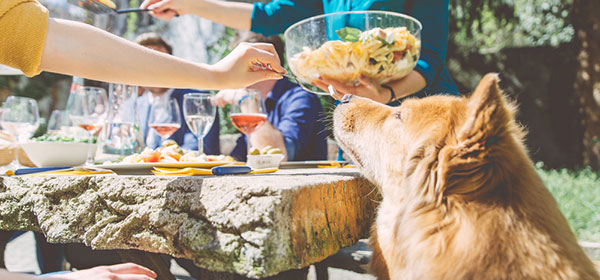While it’s nice to offer your furry friend a piece of chocolate every now and then, or may be the fat from your roast lamb, feeding your pet these types of food can be harmful.
It seems everyone has advice for what is okay for your dog to eat. Some say a piece of chocolate will automatically kill your dog (it won’t) and others say to keep them away from raw eggs and dairy (you should). Dogs do have an incredible constitution, brought about by generations of scavenging – and we’re talking right back to prehistoric times – but there are some foods or ingredients you should avoid, and some you should never feed your pets. Here’s a list of 10 of the worst offenders.
Alcohol
Irresponsible pet owners may find it funny to pour a beer into the dog’s water bowl, but alcohol can wreak havoc on your pet’s brain and liver. Yes, in high doses, alcohol is also bad for humans, but for dogs and cats it’s much, much worse.
Xylitol
Xylitol is a sugar alcohol, used as a sweetener in lollies, gum and confectionary. Feeding hard or soft lollies to your pets causes xylitol toxicosis – extreme hypoglycaemia which can result in a loss of coordination, depression, collapse and seizures in as little as 30 minutes. Many people won’t realise that xylitol is also found in toothpaste, so take care to use pet-friendly alternatives.
Onions, garlic and chives
Onions, garlic and chives contain an ingredient called thiosulphate which is toxic to cats and dogs, causing a condition called haemolytic anaemia, which damages the red blood cells circulating through your pet’s body and causes them to burst.
Caffeine
Foods that contain caffeine are very dangerous for your pets. Coffee, cola and tea are the biggest culprits, but chocolate, cocoa powder and energy drinks should also be avoided. Dogs and cats are more sensitive to the effects of caffeine than people, and although a couple of laps of coffee, tea or cola won’t poison your pet, if a small cat or dog were to eat coffee grounds, tea bags or, worse, a couple of diet pills, they could die.
Milk and dairy
Drinking milk or eating dairy products won’t affect some dogs, but others will experience intestinal distress leading to gas, diarrhoea or vomiting.
Fat
The fat trimmed from your meat may seem like an irresistible treat, but it’s actually very bad for your pet. Fat trimmed from cooked or uncooked meat can cause digestive problems, pancreatitis, kidney failure or liver damage in dogs.
Fresh fruit
Fruits such as apples, bananas, apricots, cranberries, pineapple and pears are okay to give to your dog – so long as you remove pips and seeds. In fact, there’s a long list of fruits that are fine for your pets. Take care not to feed them avocado, as it contains a fungus called persin that is toxic to animals. Cherries, grapes and raisins can cause kidney damage, while lemons, limes, grapefruit and persimmons can cause an upset stomach. Peaches, plums and persimmons also contain cyanide that could poison your pet or, at the very least, block their digestive system.
Salty foods
Foods high in salt can lead to excessive thirst and urination, vomiting, diarrhea, depression, tremors, elevated body temperature, seizures, and possibly sodium ion poisoning or even death. So, avoid feeding potato chips, pretzels and salted popcorn to your pets.
Raw egg
Raw egg can contain salmonella or E. coli, and even though it may be okay for humans to consume, it’s a no-no for pets.
Coconut and coconut oil
In small amounts, foods containing coconut or coconut oil aren’t likely to do your pet any harm. However, fresh coconut flesh and milk contains oils that can cause stomach upset or diarrhoea.
Nuts
Almonds, pecans and walnuts all contain high amounts of oils and fats, which can cause vomiting, diarrhoea and potentially pancreatitis in pets. Macadamia nuts can lead to general weakness, depression, vomiting, tremors and hyperthermia in dogs.
Pizza or bread dough
Yeast dough can rise and cause your pet’s stomach to bloat, twist and become a life-threatening emergency. Also, a by-product of yeast dough is ethanol which, if digested, causes the same problems as alcohol.
Do you feed any of these foods to your pet? Do you know of any others that are harmful?
Related articles:
A drug-free way to boost your health
Dogs who look like their owners
Treat your pet with caution

